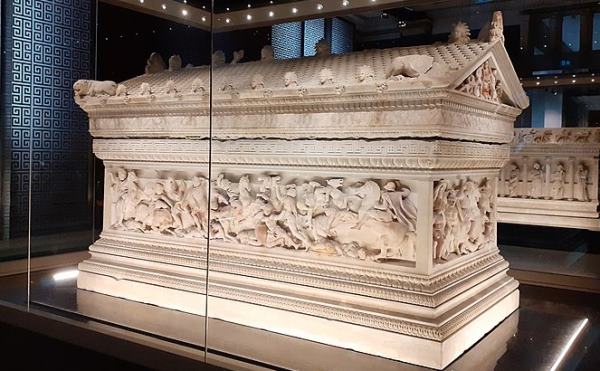
Throughout history, tombs and coffins have been very valuable for all civilizations that have realized that death is not an end but a resurrection in another realm. In some civilizations, laws were made to ensure that the tomb types were the same for each individual who passes away, and it was forbidden to own larger and more lavish tombs and coffins in exchange for money. In some civilizations, the value of the deceased’s grave and coffin increases according to the works of the deceased in the world. In the ancient Greek and Persian empires, rather densely embroidered and depicted sarcophagi were made instead of tombs. I think Alexander the Great Sarcophagus, which is the subject of this article, is really worth seeing and knowing.
Alexander the Great Sarcophagus is a sarcophagus that is thought to have been built in the last quarter of the 4th century BC and takes its name from the figure of Alexander the Great among the reliefs on it. It was unearthed in Sidon (today Lebanon) excavations in 1887 by Osman Hamdi Bey, who started museology in the Ottoman state. Today, it is exhibited in the Istanbul Archaeological Museums.
Although it is called Alexander the Great Sarcophagus, it does not actually belong to Alexander. It is thought to belong to the King of Sidon, Abdalonymus, and it is called by this name because it has Alexander on it. On the obverse side of the sarcophagus, Alexander is shown on his horse on the left and is depicted with a lion’s skin on his head. On the sarcophagus, the battle and hunting scenes of the Persians and Greeks are depicted. Who is Persian and who is Greek can be easily understood from the clothes.
Alexander the Great Sarcophagus is the largest known sarcophagus in the world. The sarcophagus, measuring 2.12 m x 3.18 m x 1.67 m, was completely made of marble. On its cover is a triangular pediment, which is often seen in ancient temples’ architecture. Just like the marble statues, the paints on this sarcophagus were eroded and erased over time. One of the wide sides of the sarcophagus depicts the war between the Persians and the Greeks. Here, Alexander the Great, who is fighting on his horse on the far left, is shown like he almost defeats the Persian armies. This scene is thought to be the Battle of Issus in 333 BC.
On the other wide side of the sarcophagus, there are hunting scenes showing Macedonians and Persians hunting and helping each other. The tribes fighting on the opposite side of the sarcophagus are organizing a hunting party together on the other side. This is also an indication that the relations of the two nations in the context of history have undergone changes.
It dates back to the end of the 4th century BC. This makes it almost modern and therefore of particular interest to anyone who wishes to learn more about Alexander the Great and the socio-political situation after his death.
Hire Istanbul Tour Guide
Alexander the Great Sarcophagus in Istanbul Archeology Museums is one of the hundreds of hidden gems of Istanbul. Visit Istanbul to see Alexander the Great Sarcophagus, Hagia Sophia, Blue Mosque, Grand Bazaar, Spice Market, and the mesmerizing Bosphorus! Istanbul offers more and more attractions being added to this small list I made. Contact me to learn more about the artifacts in Istanbul museums and the rest of Turkey. See you soon, Hasan Gülday.